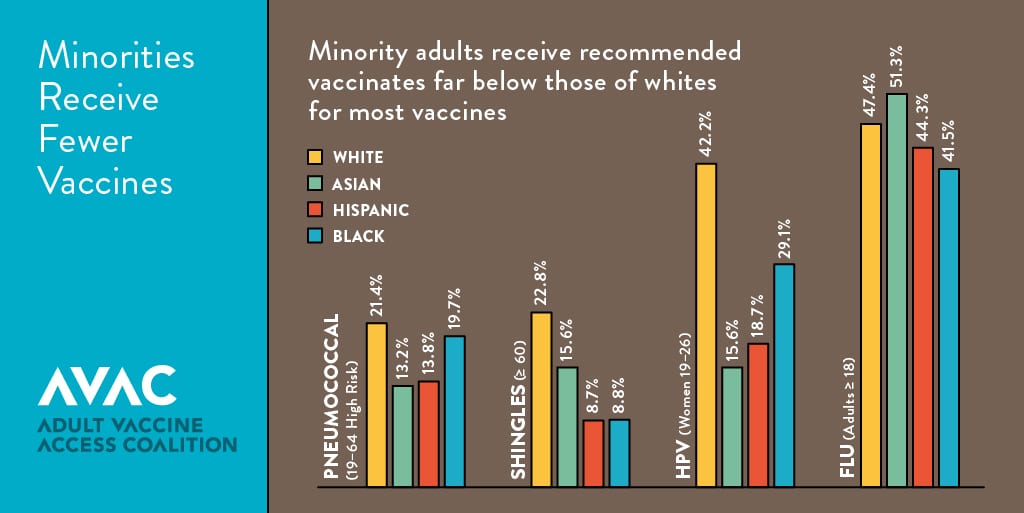Every American Should Have Access to Life-Saving Vaccines
April 2016 is National Minority Health Month and this week marks World Immunization Week. This year’s theme for Minority Health month is “Accelerating Health Equity for the Nation.” Our nation has made important progress in recent years toward increasing immunization rates among all Americans. This is particularly true for children: disparities in childhood vaccination coverage across socio-demographic groups have essentially been eliminated over the past decade. But when it comes to adult immunization, we have not been nearly as successful.
The truth is vaccines remain out of reach for far too many Americans, especially among non-white populations. For example, 28 percent of Americans over age 60 have been vaccinated for shingles, including 32 percent of whites. But these figures are far lower for minorities: only 16.5 percent of Asians/Pacific Islanders, 14.6 percent of Hispanics, and 11.6 percent of Blacks. Moreover, compared to non-Hispanic whites, African Americans age 65 and over are 20 percent less likely to receive a flu vaccine and Asians/Pacific Islanders are 20 percent less likely to receive a pneumonia vaccine.
These disparities translate into significant health and financial repercussions. Every year, more than 50,000 adults in the United States die from vaccine preventable diseases and thousands more suffer serious health problems that recommended vaccines can prevent. Vaccine preventable diseases also come with a heavy economic cost: among adults over age 60, four vaccine-preventable diseases—flu, pneumococcal, shingles and pertussis—result in $26.5 billion in annual healthcare expenditures.
To put that figure in perspective: $26.5 billion is nearly four times the approximate annual budget of the entire CDC.
The Adult Vaccine Access Coalition (AVAC), a diverse coalition of health care providers, vaccine manufacturers, pharmacies, and public health, patient, and consumer groups, believes all Americans—no matter their age, race, location or socioeconomic status—should have access to life-saving vaccines. Raising immunization rates overall is important but it’s also insufficient; we have to make sure that higher rates extend to all populations, not just some and not only for those who can afford to pay.
Representatives Eddie Bernice Johnson (D-TX-30), Ami Bera (D-CA-07), and Michelle Lujan Grisham (D-NM-01) recently led a group of more than 30 bipartisan Members of Congress urging the Centers for Medicare and Medicaid Services (CMS) to ensure greater health equity for seniors by calling on Medicare Part D health plans to reduce financial barriers to vaccine access. Read press release here.
The World Health Organization commemorates World Immunization Week with the theme “Close the Immunization Gap: Immunization for All Throughout Life.” To help mark National Minority Health Month and World Immunization Week, we ask that you join us in sharing our infographic and blog post on the topic. Together, we can raise awareness of the disparities that persist in adult immunization rates, help increase access to life-saving vaccines and ensure that adult immunization in the United States becomes one of the crowning public health achievements of the 21st century.
